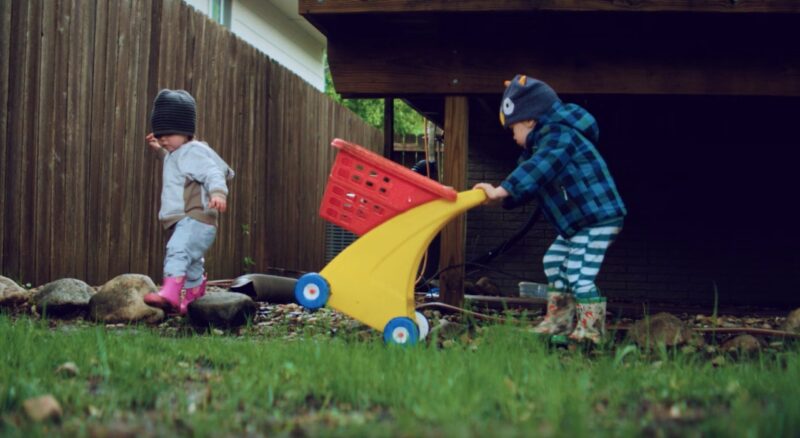As a parent, I’ll never forget the day when my four-year-old managed to scale our kitchen counters, raid the cookie jar, and create an art masterpiece on the living room wall, all while I was on a brief 10-minute phone call. That’s the unmatched energy of children for you!
While I sometimes wish I had a fraction of that enthusiasm on a Monday morning, raising a super high-energy child brings its own set of challenges. If you’re nodding in agreement as you recall similar events, you’re in the right place.
Here are 10 strategies I’ve found invaluable, and I hope they offer some solace and guidance on your energetic parenting journey.
1. Understand Their Energy

High energy in children isn’t always a sign of misbehavior or a lack of discipline. Many times, it’s just part of their natural temperament.
What Causes High Energy in Kids?
Some children are just naturally more energetic than others. This can be due to a combination of:
- genetics
- personality
- environmental factors
It’s essential for parents to recognize that high energy isn’t necessarily a problem to be fixed, but rather a trait to be understood and channeled.
Can It be Beneficial?
While it can be challenging to keep up with high-energy children, it’s worth noting that their enthusiasm often leads to a high level of curiosity, creativity, and determination.
These are all traits that can be beneficial in the long run, especially if parents can help channel this energy in positive directions.
2. Create a Routine
Consistency can be key to helping high-energy kids know what to expect and when to expend their energy.
The Importance of Predictability
A consistent routine provides a sense of security for children. For high-energy kids, knowing what’s coming next can help them prepare mentally and emotionally.
For instance, if they know they’ll be going to the park after lunch, they might be more inclined to sit still during mealtime.
Flexibility Within Structure
While it’s essential to have a routine, it’s equally crucial to be flexible within that structure. This means allowing room for spontaneity and adjusting as needed based on your child’s mood and needs.
3. Designate “Energy Zones”

Creating specific areas in your home where it’s okay to be loud and active can help children understand boundaries.
The Living Room vs. The Bedroom
For example, the living room might be designated as a place where it’s okay to jump, dance, and play, while the bedroom is for quiet activities like reading or drawing.
By setting these boundaries, kids can have an outlet for their energy without feeling like they’re constantly being told to calm down. My son actually likes this concept and he adapted very quickly.
Outdoor Play Areas
Never underestimate the power of fresh air. Having designated outdoor areas where children can run, climb, and play to their heart’s content is essential.
Whether it’s your backyard, a nearby park, or a community playground, make sure your child gets regular opportunities to play outside.
4. Engage in Physical Activities Together

Physical activity isn’t just good for their bodies; it’s also beneficial for their minds and emotional well-being.
Family Exercise Time
Making exercise a family affair can be a win-win. Not only does it help high-energy kids burn off some steam, but it also promotes a healthy lifestyle for everyone involved. Consider activities like hiking, cycling, or even just a walk around the neighborhood.
Joining Sports or Dance Classes
Enrolling your child in organized sports or dance classes can be a great way to channel their energy. Not only do they get to be active, but they also learn discipline, teamwork, and other essential life skills.
5. Promote Creative Outlets
Creativity can be a fantastic channel for their energy, allowing them to express themselves in unique ways.
Arts and Crafts
Drawing, painting, crafting—these activities can be calming for the mind while still keeping the hands busy. Set up a designated art space in your home where your child can let their imagination run wild.
These are common activities in my house and to be honest – we all enjoy them!
Music and Instruments
Whether it’s singing, dancing, or playing an instrument, music can be a therapeutic outlet for high-energy kids. It not only helps them focus but also provides a medium for self-expression.
6. Ensure Proper Nutrition
What kids eat can significantly impact their energy levels and overall mood.
Balanced Meals
Ensuring your child receives a balanced diet with whole grains, proteins, fruits, and vegetables can help stabilize their energy levels. Avoiding excessive sugar and processed foods can also prevent unnecessary spikes in energy.
Hydration is Key
Dehydration can sometimes be mistaken for hyperactivity. Ensure your child drinks enough water throughout the day. Keeping them hydrated can help maintain consistent energy levels and improve overall well-being.
7. Prioritize Quality Sleep

Rest is crucial, especially for children who are always on the go. It’s essential for physical health, mental well-being, and mood stabilization.
Establishing a Sleep Routine
Routine is just as essential at bedtime as it is during the day. Create a consistent bedtime routine that includes calming activities such as reading or listening to soft music. This helps signal to high-energy kids that it’s time to wind down.
Creating a Calm Sleep Environment
A calm and peaceful environment can make a world of difference in sleep quality. Consider dim lighting, cool temperatures, and perhaps a white noise machine to drown out any potential disturbances.
8. Encourage Mindfulness and Relaxation
Introducing kids to mindfulness practices can help them learn to center themselves, especially during moments of high energy or potential overwhelm.
Benefits of Breathing Exercises
Breathing exercises are simple yet powerful tools. By focusing on their breath, children can learn to regulate their emotions and bring their energy levels down a notch when needed.
Trying Out Child-Friendly Yoga
Yoga isn’t just for adults. Many poses and routines are kid-friendly, helping them stretch their bodies, focus their minds, and relax. Plus, it’s an excellent activity to do together!
9. Set Clear Expectations and Boundaries
High energy shouldn’t equate to a lack of discipline. Set clear expectations and let them know the boundaries.
The Power of Positive Reinforcement
Rather than focusing solely on what they shouldn’t do, highlight and reward the behavior you want to see. This can be more effective than constant reprimands and can help build self-esteem.
Consistent Consequences
If boundaries are crossed, ensure that consequences are consistent. This doesn’t mean being overly strict, but rather ensuring that your child understands the relationship between actions and consequences.
10. Foster Strong Emotional Connections
Building a deep emotional bond with your high-energy child helps them feel secure, understood, and more likely to communicate their feelings.
The Value of Active Listening
It’s easy to dismiss a child’s concerns or emotions in the hustle and bustle of daily life, especially when trying to manage high energy levels. However, taking a moment to genuinely listen can provide invaluable insights into their world.
By actively listening, you can better understand the source of their energy and possibly discover underlying concerns or emotions driving their behavior.
Quality Time Matters
In the whirlwind of managing day-to-day tasks, it’s essential to carve out uninterrupted quality time with your child. This doesn’t necessarily mean planning elaborate activities.
Simple things like reading a book together, cooking, or just chatting about their day can go a long way in strengthening your bond. Remember, it’s the quality of time spent, not necessarily the quantity, that makes the most significant impact.
FAQs
Are High Energy Levels in Kids a Sign of Underlying Medical Conditions?
While many children are naturally energetic, it’s always a good idea to consult with a pediatrician if you have concerns about your child’s energy levels. In some cases, persistent hyperactivity might be linked to medical or psychological conditions, such as ADHD.
However, many high-energy kids are simply exhibiting a normal range of childhood behavior.
How Can I Differentiate Between Normal High Energy and Hyperactivity that Needs Medical Attention?
Normal high energy often has periods of downtime, where the child can focus on a task, relax, or engage in quiet activities.
If your child struggles with impulse control, remaining seated, waiting their turn, or showing signs of inattentiveness consistently across different settings (like home, school, and social situations), it might be worth discussing these observations with a healthcare professional.
Are There Specific Diets or Foods that Can Help Manage a Child’s Energy Levels?
While no single diet can “cure” high energy, certain foods can help stabilize energy levels. Foods rich in protein and complex carbohydrates can provide sustained energy without the sudden spikes and crashes that sugary snacks might cause.
It’s also crucial to monitor caffeine intake from sources like chocolate or certain sodas, as they can increase energy levels in some kids.
Will My Child Eventually Outgrow Their High Energy Levels as They Become Teenagers?
Energy levels can change as children grow. While some kids may naturally mellow out as they approach their teen years, others might maintain their high energy levels into adolescence and adulthood.
It’s essential to continue adapting your parenting strategies to suit their evolving needs.
How Can Schools and Teachers Support High-Energy Kids in The Classroom Setting?
Communication between parents and teachers is crucial. Teachers can provide short, frequent breaks to allow high-energy children to move around.
Structured classroom routines, interactive learning activities, and the use of tools like fidget toys can also help in channeling their energy positively.
Is It Beneficial to Reduce Screen Time for High-Energy Kids?
While screen time can be a valuable tool for education and relaxation, excessive passive screen time can lead to restlessness, especially in high-energy children.
It’s beneficial to balance screen time with physical activities, outdoor play, and other non-digital activities to ensure a holistic approach to their development.
Conclusion
After trying countless strategies, I’ve come to realize that every burst of laughter, every wall doodle, and every cookie heist story will be the memories I cherish the most. Raising high-energy kids has taught me patience, adaptability, and the true meaning of the phrase “expect the unexpected.
Remember that every child is unique. What works for one might not work for another, so stay flexible, and patient, and keep experimenting until you find the right combination of strategies that resonate with your family’s unique dynamics.
Harness that boundless energy, celebrate the vibrant spirit of your child, and cherish the journey of parenthood.
